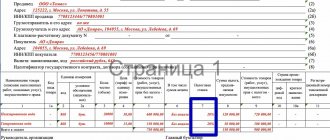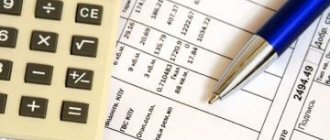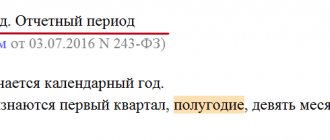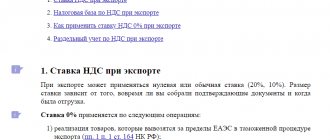General approach
From January 1, 2021, the Law of August 3, 2018 No. 303-FZ (hereinafter referred to as Law No. 303-FZ) with amendments to the Tax Code of the Russian Federation is in force. He demanded a kind of transition period for VAT from 18 to 20% in relation to goods (work, services), property rights specified in paragraph 3 of Art. 164 Tax Code of the Russian Federation.
The Federal Tax Service proceeds from the fact that:
- a 20% rate applies to goods (work, services), property rights shipped (performed, rendered) transferred starting from January 1, 2021 (clause 4 of article 5 of Law No. 303-FZ);
- does not provide for exceptions for contracts concluded before the entry into force of Law No. 303-FZ and having a continuing nature with the transition to 2021 and subsequent years .
Consequently, with regard to sales, etc., the VAT rate of 20% applies regardless of the date and conditions of the conclusion of contracts.
At the same time, on the basis of paragraph 1 of Art. 168 of the Tax Code of the Russian Federation, in addition to the shipping price, starting from 01/01/2019, the seller is obliged to present to the buyer for payment the amount of tax calculated at a rate of 20 percent.
In this regard, there is no need to make changes to the agreement regarding changes in the VAT rate. Although its parties may clarify the calculation procedure and the cost of sales in connection with an increase in the VAT rate.
Also see “Additional agreement to the agreement on changing the VAT rate from 2021: sample”.
An increase in the VAT rate does not change the procedure and time for determining the tax base for VAT for the payer.
The situation of the transition period when prepayment is made in 2021, including VAT 20%
If both parties already know in advance the situation about the future additional tax payment, then they can agree in advance (back in 2021) to pay 20% VAT. If the prepayment arrives in 2021, then this situation does not raise any questions. Everything is clear here about VAT at the rate of 20/120.
In the opposite situation, the calculation by the seller of VAT on the amount received in 2021 can be carried out on the basis of clause 4 of Article 164 of the Tax Code of the Russian Federation at a rate of 18/118. In this case, adjustments to invoices are not made. And when releasing products in 2021, a rate of 20% is applied to prepayment of VAT. He accepts for deduction the amount of VAT on the advance payment at the rate of 18/118.
Example 5. Suppose that the supply contract concluded in 2021 states that the seller will supply goods to the client in 2021 in the amount of 120 tr. (VAT 20%). The client made a 100% prepayment back in 2021.
VAT is charged on prepaid amounts in the amount of 18,305 tr. (120 tr.* 18/118). After the release of products in 2021, the amount of VAT is charged in the amount of 20 tr. (100 * 0.2) . The amount to be deducted is 18,305 tr.
Important! Despite the difference between “shipping” and “advance” VAT in the amount of 1,695 tr. (20-18,305), payment of this amount to the budget will be made by the seller at the expense of the buyer. After all, these amounts were received back in 2021 with an advance payment.
Change from 01/01/2019 in the cost of goods shipped before 01/01/2019
Due to the increase in VAT during the transition period of 2021 and 2021, there is a high probability of changes in their prices. Here are the steps to take in this case.
If goods (work, services), property rights were shipped (transferred) before 01/01/2019, then if their value changes upward or downward from 01/01/2019, the tax rate in effect on the date of shipment (transfer) is applied.
In this regard, in column 7 of the adjustment invoice, the VAT rate that was indicated in column 7 of the invoice for which the adjustment document was drawn up is given.
Changes in the VAT rate as a basis for price revision.
An increase in the VAT rate leads to an adequate increase in the price of the product and within the meaning of clause 1 of Art. 168 of the Tax Code of the Russian Federation places the burden on the buyer. In past tax rate changes, the seller and buyer shared the profits as the tax rate decreased from 20% to 18%. In the current change, the task arises of dividing the loss between the parties, which can lead to disagreements between sellers and buyers. Therefore, for all transactions concluded in 2021 and moving into 2019, we can recommend that sellers (since they are the ones who may suffer) make a reservation that, in addition to the price of the goods, the buyer pays VAT at the rate in effect on the date of shipment.
The Ministry of Finance has already spoken about the legality of changing prices under contracts concluded within the framework of the legislation on the contract system in Information Letter No. 24‑03‑07/61247 dated 08/28/2018. As officials indicated, the price of the concluded contract is fixed and is determined for the entire period of its execution, which directly follows from Part 2 of Art. 34 of the Law on the contract system. Changing the terms of the contract is not allowed, except in cases provided for by the said law. An increase in the VAT rate cannot serve as a basis for changing the contract price and is a risk for the supplier, who must take this into account when setting the price. Further, the Ministry of Finance, developing its idea, clarifies that the risks associated with the execution of contracts, including inflation, relate to the commercial risks of the supplier, which are included in the price of the application for participation in the procurement.
At the same time, Art. 95 of the Law on the Contract System allows that the essential terms of the contract can be changed in the prescribed manner if the price of the concluded contract is or exceeds the price determined by Decree of the Government of the Russian Federation of December 19, 2013 No. 1186, and the execution of the specified contract is beyond the control of the parties circumstances without changing its conditions is impossible. Thus, the contract price can be changed in accordance with the procedure established by the legislation on the contract system, including when the VAT rate changes.
Decree of the Government of the Russian Federation No. 1186 determines the following amounts of the price of a contract concluded for a period of at least three years to meet federal needs, the needs of a constituent entity of the Russian Federation and for a period of at least one year to meet municipal needs, at which or when exceeding which the essential terms of the contract may be changed in accordance with the established procedure, if the fulfillment of the contract due to circumstances beyond the control of the parties to the contract without changing its terms is impossible:
- 10 billion rubles. – for a contract concluded to meet federal needs. In this case, the price may be changed based on a decision of the Government of the Russian Federation;
- 1 billion rub. – for a contract concluded to meet the needs of a constituent entity of the Russian Federation. In this case, the price can be changed based on a decision of the highest executive body of state power of a constituent entity of the Russian Federation;
- 500 million rub. – for a contract concluded to meet municipal needs. However, the price may be changed based on the decision of the local administration.
As for other contracts - concluded before 01/01/2019, including in accordance with the Procurement Law - there are no exceptions for goods (works, services) sold within their framework (Letter of the Ministry of Finance of Russia dated 09/07/2018 No. 03-07 ‑11/64049). In other words, VAT in respect of goods (work, services) shipped (performed, provided) by the seller after 01/01/2019 is calculated at the base rate of 20%.
A special tax regime is prescribed for this type of agreement, such as a production sharing agreement. Relations arising in the process of concluding, executing and terminating production sharing agreements are regulated by Federal Law No. 225-FZ dated December 30, 1995 “On Production Sharing Agreements”, and the tax regime established for such agreements is determined by Chapter. 26.4 Tax Code of the Russian Federation. Based on clause 13 of Art. 346.35 of the Tax Code of the Russian Federation under production sharing agreements, in the event of a change in the tax rate during the term of the agreement, the tax is calculated and paid at the VAT rate established in accordance with Chapter. 21 Tax Code of the Russian Federation.
Correction of invoice for goods shipped before 01/01/2019
In the new copy of the invoice:
- you cannot change the indicators (numbers and dates) indicated in line 1 of the invoice compiled before the corrections were made to it;
- fill out line 1a, where they indicate the serial number of the correction and the date of the correction.
In this regard, when making corrections to an invoice issued for shipment before 01/01/2019, in column 7 of the amended document indicate the rate in effect on the date of shipment and reflected in column 7 of the invoice issued for the shipment of these goods.
Money 18, shipment 20
The situation with the calculation of VAT is much more complicated when the obligations of the parties are distributed between years in reverse order. If money for a product (work, service) was received in 2021, and shipment occurs only after 01/01/2019, the recipient of the money will have to calculate and pay VAT on it at the rate that is in effect on the date of receipt (clause 2, clause 1, article 167 and clause 4 of article 164 of the Tax Code of the Russian Federation, clause 4 of article 5 of Law No. 303-FZ). Therefore, the tax will be calculated at the rate of 18/118, and the tax amount determined in this way will be reflected in the invoice sent to the buyer (customer) and in the declaration. This means that the VAT determined at this rate will be transferred by the seller (performer) to the budget, and accepted for deduction by the buyer (customer).
In 2021, after shipment of goods (performance of work, provision of services), both parties will have to perform the reverse operation - deduct and restore advance VAT. And here we must remember that the amount that was calculated is accepted for deduction and restoration. Therefore, an increase in the rate at the time of shipment does not affect this part of the tax calculation operation. Since 303-FZ did not establish any special rules in this part, we are guided by the general rules: clause 8 of Art. 171, paragraph 3 of Art. 170 Tax Code of the Russian Federation.
Moreover, the procedure described above applies to both full and partial prepayment. If the agreement stipulates that only part of the money is transferred in 2018, and the rest after the new year, then money received in the current year will be taxed at a rate of 18%, and those received after the holidays will be taxed at a rate of 20%. And here it is important for the accountant to clearly separate the financial flows so that there is no confusion with the amounts of VAT that are restored and accepted for deduction - in all cases we are talking about calculated amounts, albeit at different rates.
Let's look at the situation using an example
Suppose a contract has been concluded, according to which the customer transfers payment in installments: in December 2021 and January 2019, 10,000 rubles each. The work completion certificate will be signed in March 2019. In this case, the contractor will calculate VAT in December on the received advance payment in the amount of 1,525 rubles (10,000 × 18/118) and indicate this amount in the advance invoice.
Based on this document, the customer will deduct 1,525 ₽. From the second part of the payment, the contractor will calculate VAT at the new rate: 1,667 ₽ (10,000 × 20/120) and reflect this amount in the invoice issued to the customer. The customer will accept it for deduction.
In March, after signing the act, the contractor will deduct all previously calculated advance VAT in the amount of 3,192 rubles (1,525 + 1,667). The customer will restore the same amount of VAT.
Even in a situation where shipment is carried out in parts and occurs in different years, this rule will remain unchanged, since when restoring and deducting tax on prepayment, only amounts that are offset against the goods shipped, work performed or services rendered are taken into account (Clause 6 of Art. 172 of the Tax Code of the Russian Federation and clause 3 of Article 170 of the Tax Code of the Russian Federation). Partial shipment of goods will lead to a split of the prepayment amount for VAT purposes, but the calculated tax amounts will be taken into account.
For example, a supply agreement has been concluded under which payment is made in November 2021 and February 2021 for 10,000 rubles. The goods are shipped in batches: in December 2021 for the amount of 5,000 ₽ (including VAT at the rate of 18% - 763 ₽) and in March 2021 for the remaining amount.
The supplier, having received the first prepayment in November, will calculate VAT in the amount of 1,525 ₽ (10,000 × 18/118) - the buyer will deduct this amount. After delivery of the first batch of goods, the supplier will deduct 763 ₽, and the buyer will restore this amount.
In 2021, regarding the second payment, both parties will carry out a similar operation, but at a new rate: the supplier will calculate VAT in the amount of 1,667 ₽ (10,000 × 20/120), and the buyer will deduct it on the basis of the second “advance” invoice - textures.
After shipping the second batch in March, the supplier will deduct advance VAT in the amount of 2,429 rubles (1,525 - 763 + 1,667). The same amount will be reimbursed by the buyer.
When all the money under the contract is received in 2021, and the goods are sold in 2021, the difference of 2% between the previous and current VAT can be made up if you agree with the counterparty to reduce the cost of a unit of goods, so that the amount of goods increased by the new VAT rate became equal to the prepayment.
Return of goods from 01/01/2019
VAT from the seller
When returning from 01/01/2019 the entire batch (or part) of goods - both accepted and not accepted for registration by buyers - the Federal Tax Service recommends that the seller issue adjustment invoices for the cost of goods returned by the buyer, regardless of the period of shipment of the goods. That is, until 01/01/2019 or from the specified date.
If in column 7 of the invoice to which the adjustment invoice was drawn up, a tax rate of 18% is indicated, then in column 7 of the adjustment invoice a rate of 18% is also given.
And here is what the seller should do when returning from 01/01/2019 goods paid for by persons who are not VAT payers and/or payers exempt from fulfilling taxpayer obligations related to the calculation and payment of tax, for whom invoices are not issued, and shipped (transferred ) to these persons until 01/01/2019. An adjustment document is recorded in the purchase book with summary (summary) data on return transactions made during the calendar month (quarter), regardless of the readings of the cash register equipment.
Also see "VAT during the transition period 2021 and 2021: what to do as a seller."
VAT from the buyer
If the buyer has accepted for deduction the amounts of tax presented to him for the goods he accepted for registration, then he restores the VAT amounts on the basis of an adjustment invoice from the seller (subclause 4 of clause 3 of Article 170 of the Tax Code of the Russian Federation) regardless of the period of shipment of the goods. That is, until 01/01/2019 or from the specified date.
Read also
30.10.2018
Nuances of work during the transition period
Returning goods after January 1
Let's assume that the supplier shipped goods to the buyer this year, but in January 2021 the buyer decided to return part of the goods. Let's see what consequences this will entail in terms of changes in the VAT rate.
First of all, you need to understand that the return must be made on some basis . For example, the product does not comply with the terms of the contract or is delivered defective. In this case, this will be regarded as a return of previously received goods. If there were no such grounds, the buyer accepted the goods and registered them, and only after that decided to return them - this will be considered a reverse sale.
So, if after January 2021 a return , then this operation is accompanied by the preparation of:
- an adjustment invoice if the buyer is a VAT payer;
- an adjustment document if the buyer does not pay VAT, that is, is an organization or individual entrepreneur in a special regime or an individual.
The adjustment document must be reflected in the purchase book with code 16. It is permissible to draw up one adjustment document for all such returns.
The VAT payer buyer who returns the goods will have to restore the tax if it was accepted for deduction.
Agent VAT
The change in tax rate will also affect tax agents. The obligation to withhold and transfer VAT for their counterparties for companies and entrepreneurs arises, in particular, in the following cases:
- when purchasing goods, works or services from foreign counterparties;
- when leasing or selling state property.
Agents pay VAT directly when transferring funds for goods and services that will be received or have already been received. If this happens in 2021, then VAT is paid at the old rate, if in 2021 - at the new rate.
The same rule applies to advances received, on which VAT must be paid as a tax agent.
For the amount of VAT paid by the tax agent, he is provided with a tax deduction.
Government contracts
Let us make special mention of government contracts that are concluded in accordance with Federal Law 44-FZ. The fact is that the cost of such agreements remains unchanged throughout the entire period of their execution. Therefore, most likely, suppliers will have to compensate for the difference in the VAT rate at their own expense.
New challenges for accountants
A change in the rate will entail the need to solve new accounting problems. Economic entities will have to:
- Enter a new VAT rate into your accounting systems . Most people use special accounting programs - you need to remember to update them before the end of the year so that from January 1 the rate changes by 20%.
- Ensure that revenue is accounted for at different VAT rates . This will also likely require changes to accounting programs.
- Conduct an inventory of advances received , delivery of which will be carried out in 2021. It is necessary to decide how exactly the change in the VAT rate will be taken into account (additional payment by the buyer, adjustment, and so on).
In addition, you need to think about how the correctness of conducting and processing transactions at different rates will be monitored:
- what control ratios will be used;
- How will separate accounting be carried out?
This is more relevant for the period of the first quarter of 2021 , since it is mainly during these 3 months that most issues related to changes in the VAT rate will arise.










